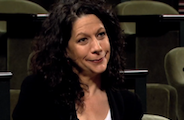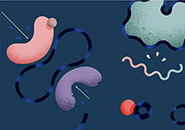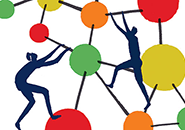Ten extraordinary New Yorkers who were given a chance will clasp their diplomas, flip their tassels, and make history on May 20, 2012, at the Gosman Sports and Convocation Center at Brandeis University outside Boston. The students are the science posse, a collection of urban-schooled, best in class who entered Brandeis four years ago as an innovative experiment in science education.
Would it be possible to group some really sharp, overlooked students and, with a combination of boot camps, mentoring, counseling, workshops, and peer support, coach them through the rigors of university-level academics to pursue scientific careers?
“It seems like we can,” says Kim Godsoe, Dean of Academic Services at Brandeis. “We have. We’ve got this formula now. And it’s really exciting, really transformative.”
The program, proposed to the Posse Foundation in 2005 by Brandeis faculty member Irv Epstein and piloted with his grant as an HHMI professor, can boast tangible success. All 10 of the first science posse members are graduating, and seven will complete majors in science—chemistry, biology, and neuroscience. Six will pursue either an M.D. or Ph.D. degree. And one of them, Nana Owusu-Sarpong, was accepted to Tufts University School of Medicine through an early admissions program as a Brandeis sophomore. He will begin a joint M.D. and M.B.A. program this summer.
Meanwhile, the science posse concept has spread. Brandeis has launched another four groups of 10. The Brandeis science posse program—and a student in the most recent group, Steven Colon—were acknowledged recently by President Obama at the second White House Science Fair. Two other schools—the University of Wisconsin–Madison and Franklin & Marshall College, in Lancaster, Pennsylvania—have begun their own science posse programs, the latter based on the Brandeis model. Texas A&M University and Bryn Mawr College in Pennsylvania have committed to launch science posses in September 2013.
These successes, however, belie a deeper story—of struggle and setbacks, soul searching and salvation. Some of the first science posse members faltered academically, especially after their first year. Others struggled with personal problems, including the need to tend to sick parents at home. Still others grappled with what many 18-year-olds at college face: questions of identity, career aspirations, and whether the initial interest in science could hold through four years of labs and long nights at the library. But all persevered and stayed connected to science in some way.
“I have changed my career course, like 50 billion times,” says Yvonne Perez, one of the science posse members who’ll graduate in May.
The child of Mexican immigrants, Perez grew up believing that becoming a doctor was the pinnacle of success. Venturing off the science track was therefore unacceptable. Yet, as she entered Brandeis and struggled through courses such as general chemistry, she questioned her own fitness for science—and almost gave it up. But the posse stepped in with academic help, moral support, and their highly visible status.
“They are the greatest source of motivation for me,” she says, “the most brilliant people I have ever met.”
As Perez realized that she was “part of this prestigious group,” chosen for some of the same reasons as the others, she gained confidence—and a reason to keep from “slacking off.”
Keeping science as her base, Perez branched off into a major called Health: Science, Society, and Policy. She plans, eventually, to obtain a Ph.D. in health or community policy. But she is still searching. “If you ask me again come May, I will tell you that I will be doing something completely different,” she adds.
A similar search for a fit befell Usman Hameedi, who felt torn between his interest in medicine and a love of poetry. “There’s science and there is humanity,” he muses, “and they are seen as a dichotomy. Ah, but to combine them both—that would be the beauty.”
And he is trying for that combination, considering a career as a science writer, or the new field of narrative medicine, in which patients tell or write stories as a way to heal.
Gliding into the Future
Four years may not have been enough exploration time for most posse scholars. A surprising six of 10 in this high-achieving group say they plan to take a year or two off after they graduate, the so-called “glide year(s).” While that was not exactly what Epstein envisioned when he proposed the posse as a means to retain diversity in the sciences, gliding is now a common practice between bachelor’s and graduate degrees, and he is not worried that his posse students are gliding into the sunset.
“It actually makes a great deal of educational sense to do something different for a year or two after college instead of plunging right into further education,” he says. “It shows great maturity.”
 |
WEB EXTRA Click on the Posse members to hear their thoughts on the program and to learn what they are up to next. |
Gliding is becoming more popular for students who want time to figure out what they want to do or to boost their résumés with job skills, community service, research, or clinical hours, says Godsoe.
For science posse members, there is something more. Many, when younger, did not have the exposure or resources to hunt for alternatives to a medical career. And once that door to exploration opened at Brandeis, posse members wanted to keep it open longer in preparation for doing something big.
All of them have the potential to make some big impact on whatever they do because they are very strong, and very thoughtful, and very, very determined.
Susannah Gordon-Messer
But for those for whom a medical or science degree is certain, the science training itself may open the door opener to success.
“A person is very fortunate to be good at science because science can be applied to so many things,” says posse member Gloriya Nedler. “It doesn’t always work the other way around. So having the science background is like starting at the top.”
With a strong interest in neuroscience, Nedler will apply to medical schools this June. In the meantime, she’s been offered a full-time position at Harvard Medical School for the coming year to lead a study of observed disparities in the advancement of women of color in academic medicine.
“All of them have the potential to make some big impact on whatever they do,” says biophysicist Susannah Gordon-Messer, who mentored the science posse for two years. “Because they are very strong, and very thoughtful, and very, very determined.
Hameedi, for example, plans to take a year or two off, possibly to travel. He learned in a class that schizophrenia affects Japanese differently than Americans, which prompted his curiosity to understand how culture can affect the course of mental disorders. He hopes to bring that knowledge of diversity and disease to his work in medical school—and transform medical care for people overlooked by the American medical system.
While no one can guarantee that he or the other five gliders will actually follow through with their plans for a higher degree in science—and more—everyone is betting on them.
As other posses follow suit, says Hameedi, the group is proud of what they accomplished. “We set the bar really high.”







